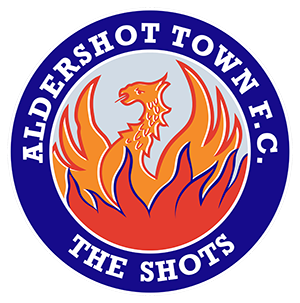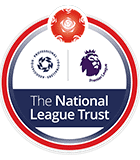Formation and the Isthmian League Years
On March 25th 1992, Aldershot FC became the first Football League team to fold during the season since Accrington Stanley in 1962.
From the ashes came phoenix club Aldershot Town, who were formed on April 22nd 1992 and managed by ex-Aldershot FC centre back Steve Wignall.
The “new” Shots began life in Isthmian League Division 3 and opened the 1992-93 season in a carnival atmosphere at the Recreation Ground against Clapton. Braces from Mark Butler and Steve Stairs secured a 4-2 win in front of 1493 fans, which was more than watched their predecessors’ last home game at the same ground.
Aldershot Town won their first 10 games and didn’t suffer their first (and only) defeat of the season until losing a league game at Clapton on January 2nd (at Clapton) in what was their 24th outing in all competitions. By then, they had broken attendance records at most grounds at which they had played, buoyed by a superb away following of around 1000. The campaign finished with the Shots as champions by a commanding 18-point margin, whilst strikers Mark Butler and Steve Stairs scored a combined total of 62 goals in all competitions.
A second successive promotion (via a third-place finish) followed in 1993-94 together with a run to the FA Vase quarter-finals.
From the start of their inaugural season, Aldershot Town went 20 months (35 games) before suffering their first-ever home league defeat – to Banstead Athletic in April 1994.
Steve Wignall departed in January 1994 to take charge of Division 3 side Colchester United and was replaced by ex-Nottingham Forest winger Steve Wigley. Despite a strong finish to the 1994-95 season, the Shots missed out on a third successive promotion on goal difference. Following fifth- and seventh-place finishes over the next two seasons, Wigley left to take up a post in (former club) Forest’s youth set up in the summer of 1997.
Following a spell under the caretaker management trio of Andy Meyer, Mark Butler and Joe Roach, Enfield boss George Borg was appointed in September 1997 and his first season yielded increased crowds and the Isthmian League Division 1 title. In 1998-99, striker Gary Abbott scored 48 goals in all competitions as the Shots won both the Isthmian League Cup and the Hampshire Senior Cup. In 1999-2000, they retained the latter trophy, won the Isthmian League Charity Shield and ended the campaign as runners-up (to Dagenham and Redbridge) in the Isthmian League Premier Division.
A fourth-place finish was claimed in 2000-01, whilst November 2001 saw a club record crowd of 7500 fill the Rec for the 6-2 defeat by Brighton and Hove Albion in the FA Cup first round. Following a run of poor results and pressure from fans, Borg resigned in mid-January 2002.
Borg’s assistant Stuart Cash took temporary charge before Terry Brown left his post at Hayes in late March to come to North East Hampshire, thus beginning a five-year love affair with the Shots fans. Following a third-place finish and a third Hampshire Senior Cup win in 2001-02, the squad was overhauled and, having attained top spot in mid-November 2002 (ironically by way of victory over Brown’s former club Hayes), the Shots remained in top spot to claim the title and, with it, promotion to the Football Conference; they also retained the Hampshire Senior Cup with a victory over Bashley.
The Conference Years
Following a home victory over Accrington Stanley, Aldershot Town remained in the play-off positions for the entire 2003-04 season as well as winning the Isthmian League Charity Shield (for a second time) and reaching the FA Trophy semi-finals, where they lost to eventual winners Hednesford Town. Further disappointment followed, when the Shots were beaten on penalties by Shrewsbury Town (after a 1-1 draw) in the play-off final at Stoke City’s Britannia Stadium.
That summer, one era ended as another began: record appearance-maker Jason Chewins left the club having worn the red and blue of Aldershot on 489 occasions. Meanwhile, the club went full-time.
More play-off heartache was experienced in 2004-05, this time in the shape of a shoot-out defeat at Carlisle United in the semi-finals. The next two seasons were disappointing for the Shots (13th and ninth places respectively being secured), whilst the only silverware came by way of a fifth County Cup in 2006-07.
In March 2007, Terry Brown resigned to take care of his wife, who had been ill for some time. Assistant Manager Martin Kuhl took caretaker charge for the remainder of the season.
Promotion to the Football League
Gary Waddock was appointed as Aldershot Town manager in May 2007, whilst Martin Kuhl stayed on as his assistant. The Shots played an attacking brand of football, especially at home, where they lost just three times and, having won the Conference Premier title by drawing 1-1 on an emotional night in Exeter, they finished the 2007-08 season with an 18-match unbeaten run and two divisional records: 31 wins and 101 points. A “double” was achieved as a 3-3 extra time draw against Rushden and Diamonds at the Recreation Ground was followed by a win in the shoot-out to claim the Setanta Shield.
Sixteen years after the quest had begun, the town of Aldershot had a Football League side to cheer again.
A club record £130,000 was received from Crewe Alexandra for winger Joel Grant in the summer of 2008.
The Football League Years
Scott Donnelly (the Shots’ scorer “that night” at Exeter) scored the only goal of the club’s first-ever Football League game, a 1-0 win at Accrington, and the club finished a respectable thirteenth in League 2 in 2008-09.
In mid-October 2009, Waddock and Kuhl left the (now named) EBB Stadium to join Wycombe Wanderers. Jason Dodd and Paul Williams took caretaker charge before ex-Reading assistant manager Kevin Dillon was appointed as boss. An unexpected sixth-place finish was attained in 2009-10, but a 3-0 aggregate defeat to Rotherham United haled the Shots at the semi-final stage.
With the 2010-11 season having yielded several poor performances, including a toothless 2-0 loss at Conference South outfit Dover Athletic in the FA Cup second round, Kevin (and assistant Gary Owers) were dismissed in early January having attained just a dozen wins from 39 games in all competitions. When Kevin departed the EBB Stadium, Aldershot were in 20th place in League 2 and just six points above the drop zone.
The next occupant of the Shots hot seat was Dean Holdsworth, who resigned from his post at Newport County to come to Aldershot, eventually guiding the club to a mid-table finish that season.
Aldershot Town gained nationwide attention in 2011-12, when FA Premier League giants Manchester United visited the EBB Stadium for a League Cup fourth round tie; 7044 fans saw the Red Devils win 3-0 in front of the Sky Sports cameras. The Shots had a good end-of-season run-in and eventually finished just six points outside the play-offs in 11th. Unfortunately, despite paying a club record fee to Stevenage for striker Craig Reid, neither the home form nor the style of play from the previous season was evident very much in 2012-13 and Holdsworth was sacked in mid-February with the team in 20th spot.
Former Rotherham United boss Andy Scott was brought in, but couldn’t stem the tide and relegation back to the Conference Premier (the club’s first such event) was confirmed at end of the season as the Shots eventually finished rock-bottom of the table.
Administration and Return to the Conference Premier
On May 2nd 2013, just five days after their relegation from League 2, Aldershot Town officially entered administration with reported debts of £1.4 million.
Following a period of uncertainty over the club’s survival, which led to the departure of the majority of the playing staff and numerous redundancies behind-the-scenes, the club exited administration under the auspices of a CVA on July 30th, with a consortium led by former chairman Shahid Azeem taking ownership of the club on August 1st.
The Shots began the 2013-14 season with a 10-point deduction as a punishment for the aforementioned entry into administration. With a hastily-assembled squad (some of whom were signed in the hotel the night before the season’s opener at Grimsby Town) that hadn’t trained together, even the most ardent Shots fan wasn’t expecting the draw and three wins in the opening seven games that saw the deficit wiped out by the first week of September.
However, within two months of that achievement, Andy Scott’s men were knocked out the FA Cup by Gloucestershire side Shortwood United, who were three divisions and 65 places below them in the football pyramid; what made the 2-1 replay defeat (following a 1-1 draw) more embarrassing was that it occurred in North East Hampshire!
An eight-game winless run across January, February and March saw the Shots eliminated at the quarter-finals stage of the FA Trophy (by Havant and Waterlooville) and plunged into a relegation fight. However, Brett Williams’ 24 x league goals coupled with the return of Brentford loanee midfielder Manny Oyeleke and the arrival of centre half Mark Phillips (on loan from Southend United) resulted in the club’s Conference Premier place being retained. The team attained four wins out of seven at the end of the season, with safety being assured by a 2-1 win on Easter Monday at local rivals Woking in the penultimate game – Mission Accomplished!
Exiting CVA and Starting From Zero in 2014-15
On July 31st 2014, Aldershot Town announced that they had paid off all of their debts, which enables them to exit the auspices of the CVA after just 12 months – a massive two years ahead of the required date! The icing on the cake came with the additional news that the club had made “a modest profit” in the first year of trading under the new owners.
Even though the fans’ expectation levels were low, the 2014-15 campaign still yielded very little joy. The only real highlight was the 1-0 victory over League 2 side Portsmouth at home in an FA Cup first round replay following a well-deserved 2-2 draw at Fratton Park. Another strong home display saw a goalless draw claimed against League 1 Rochdale in round 2, although many criticised the fact that the Shots’ dominance didn’t materialise into a victory. A season-defining four days was endured in mid-December – they were surprisingly dumped out of the FA Trophy at home in a first round tie by Isthmian League Division 1 South side Burgess Hill Town (who were 55 places below the Shots in the football pyramid) before being brushed aside by Rochdale in their FA Cup second round replay (4-1). Following constant criticism of his playing style, a run of just one win in 12 games in all competitions (including five successive home league defeats and just two wins in 11 league games that had seen the Shots drop to 18th in the table) led to Andy Scott being sacked in mid-January 2015.
Defender Chris Barker took picked up the reins for the season’s remaining 15 games on a player-caretaker basis and led the Shots to Conference safety before stepping aside in the summer to become player-assistant to newly-appointed ex-Dundee boss Barry Smith.
2015-16
The 2015-16 season was another one of disappointing performances, epitomised by a club record 8-2 defeat by Chester in early March. The Shots finished the campaign having scored just 23 home league goals, equalled the club record for fewest home league wins (7) and most home league losses (12) as well as setting new club records for most league losses in a season (22) and lowest average home league attendance (1607); the season was also the fourth in succession in which the aforementioned crowd figure had dropped. Conversely, the nine away league victories was the club’s best tally since they won the Conference Premier in 2007-08. Another lasting memory will be the dearth of attempts on goal that the Shots had over the course of the season.
With boss Barry Smith having decided to return to his native Scotland, May 2016 saw Gary Waddock become the first-ever Shots boss to return, which ultimately led to the Shots starting a campaign with a higher level of hope than had been seen for many a season.
That optimism proved well-founded, as Waddock’s new-look side lost just three of their first 16 National League games and, after a sticky period in October and November saw them win just twice in ten games, then embarked upon a superb run from the start of December. The Shots lost just two games in the second-half of the season to secure fifth place in the table and a Play-Off semi-final against Tranmere Rovers. Unfortunately, The Shots lost the home leg 3-0 but at least restored a great deal of pride with a battling 2-2 draw in the Prenton Park return.
Having retained the vast majority of his squad, Waddock entered 2017-18 with optimism. The squad picked up where they left off and spent the majority of the season challenging for the title. They lost 2-1 at home to eventual champions Macclesfield Town in February where a win would’ve put the Shots top of the league. Form dipped afterwards but the Shots still managed to finish 5th in the table and faced Ebbsfleet United in the new play-off eliminator format, with penalties and play-offs again proving to be the Shots ‘Achilles heel’, a fiercely contested 1-1 draw was played out at the EBB Stadium with former-Shots player Dave Winfield equalising in the final minute of extra time for Ebbsfleet, the Shots had two chances two win on penalties but failed to convert either and the Fleet progressed through.
To discover more about the Club’s heritage and history, please visit our archival site: http://archive.theshots.co.uk/















